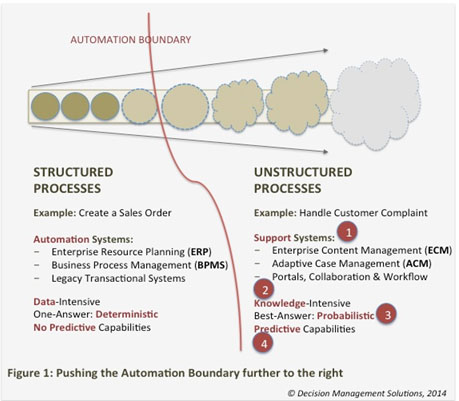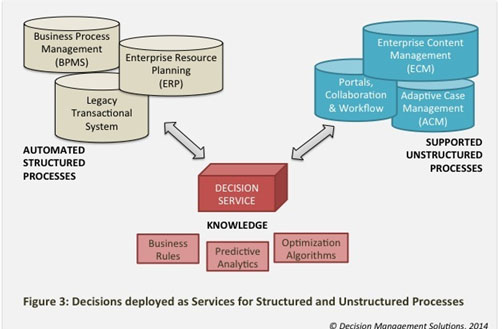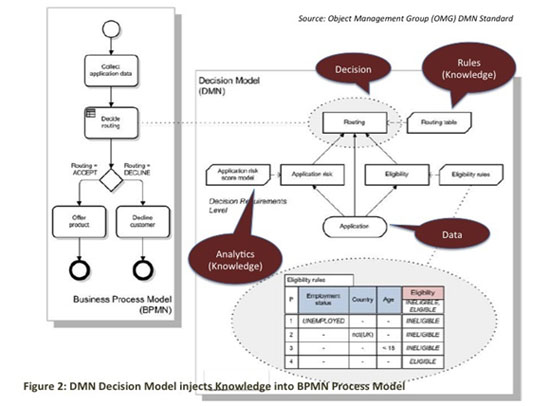The race to define, standardize, automate and improve processes started with Henry Ford’s assembly lines. This ‘structuring’ of processes has driven tremendous productivity benefits for organizations, and managers are therefore trained to consider the organization to be a sum total of its processes. A key management goal is to drive more structure into business processes with automation being the desired end-state. While most data-driven, transactional processes have been automated over the decades, there is a class of knowledge-driven processes that have eluded efforts to structure or automate them. These ‘unstructured’ processes are variously referred to as Manual Processes, Expert Processes, Case Management, Supervisory Functions and similar. And the goal has been to apply process-centric thinking to structure and automate these pesky but high-value-add processes. This is not working and a new decision-centric approach needs to be considered.
Unstructured Processes Need Knowledge

Pushing the automation boundary deeper into Unstructured Processes (Figure 1) is a desirable goal but challenging due to the following characteristics of Unstructured Processes.
- Systems Support = Content Library: Since unstructured processes are loosely defined and rely on access to readily available knowledge, they are provided with ‘Support’ systems like an Enterprise Content Management (ECM) system, an Adaptive Case Management (ACM) system or a variety of collaboration toolsets. This is a more of a support role compared to the ‘Automation’ systems like Enterprise Resource Planning (ERP) and Business Process Management Systems (BPMS) that run structured processes.
- Knowledge-Intensive: Unstructured processes cannot run just based on raw data. They require a higher level of knowledge abstraction generally codified as Business Rules, Advanced Predictive Models, Optimization Algorithms and Learning Feedback Loops. These knowledge representation technologies have traditionally been difficult to work with but have now become much more accessible and scalable. Big Data is available now for mechanical knowledge extraction and learning. Being able to ‘inject’ this knowledge into processes is now much easily understood using Decision Modeling.
- Probabilistic Answers: Instead of programmatically deriving one answer, unstructured processes consider a variety of dynamic pieces of contextual knowledge and then make the ‘best’ choice depending on ‘chances’ of success. Decision Models capture this decision making and allow powerful technologies to be applied for plugging knowledge into processes.
- Predictive Capabilities: Unstructured processes involve using hunches and educated guesses for what might happen in the future given current data. These predictions are informal and vary greatly depending on the skills and experience of the agent. Formal predictive models can be generated from historical data and applied to decision making if decision requirements have been explicitly captured using Decision Models.
Decision Models Inject Knowledge into Processes
Unstructured processes can be managed better if organizational knowledge can be systematically ‘injected’ into them. A Decision-Centric approach allows knowledge and data to be organized and accessed in a way that it can be consumed by explicit decisions that are part of processes (Figure 2). The Decision Model Notation (DMN) standard from Object Management Group (OMG) defines decision models and decision requirement models, along with the peer relationship with business process models defined using Business Process Model Notation (BPMN).
The key breakthrough is the realization that a process-centric view alone cannot push the automation boundary deeper into unstructured processes, but a decision-centric view is a critical requirement. A formal Decision Management Manifesto establishes the principles of this decision-centric view.
Deploy Structured Decision Services to Manage Processes

Explicit Decision Modeling results in detailed specifications and design for Decision Services. These are stand-alone services encapsulating powerful Decision Management Technologies. All modern systems can access these decision services and thereby take advantage of organizational knowledge in their processing (Figure 3).
A decision-centric approach that describes Decisions and Knowledge in terms of Decision Models opens up practical means for using advanced technology for Unstructured Processes. Whether all processes can be structured or not is a philosophical debate and irrelevant in the short run, since the goals of structured management are readily achieved by explicitly modeled, Structured Decisions.


















